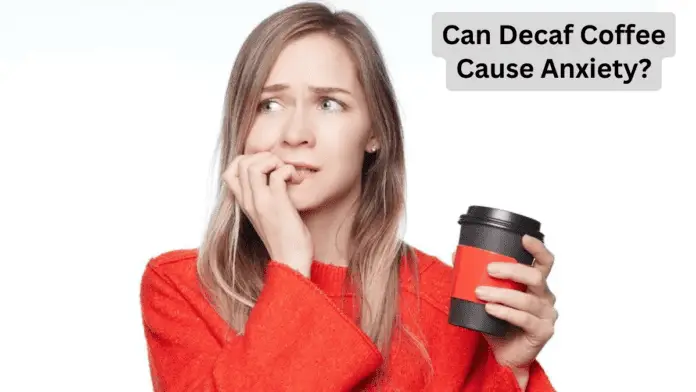
If you’re a coffee lover, the thought of giving up your daily cup of Joe might be too much to handle. But, what if you suffer from anxiety and worry that your caffeine intake is exacerbating your symptoms? Is decaf coffee a good alternative? Can decaf coffee cause anxiety? In this article, we explore the relationship between decaf coffee and anxiety to help you make an informed decision about your coffee consumption.
What is Decaf Coffee?
Before we dive into the effects of decaf coffee, it’s important to understand what it is. Decaf coffee is made by removing most of the caffeine from the coffee beans. There are several methods for decaffeinating coffee beans, including the Swiss Water Process, the CO2 method, and the direct solvent method. The end result is a cup of coffee that has significantly less caffeine than a regular cup of coffee.
Does Decaf Coffee Actually Have Caffeine?

One common misconception about decaf coffee is that it has no caffeine at all. However, this is not entirely true. While the amount of caffeine in decaf coffee is significantly less than in regular coffee, there is still some caffeine present. According to a specialist from UC Davis Health, an 8-ounce cup of decaf coffee contains anywhere from 2 to 15 milligrams of caffeine. To put this in perspective, a regular cup of coffee contains anywhere from 70 to 140 milligrams of caffeine.
Can Decaf Coffee Cause Anxiety?
Now, let’s address the question at hand. Can decaf coffee cause anxiety? The answer is not as straightforward as you might expect. Decaf coffee alone is not likely to cause anxiety. However, for individuals who are already prone to anxiety, decaf coffee can still trigger symptoms. This is because decaf coffee still contains some caffeine, and caffeine is known to increase anxiety in some people. Additionally, decaf coffee can have other compounds that can impact anxiety levels, such as acids and tannins.
Decaf Coffee and Pre-existing Anxiety
If you already suffer from anxiety, it’s important to be cautious with your coffee intake, whether it’s regular or decaf. Research has shown that caffeine can worsen anxiety symptoms in people who are already prone to the condition. If you find that even small amounts of caffeine increase your anxiety, it’s best to avoid decaf coffee altogether.
Decaf or Regular Coffee: Which Causes More Anxiety?
While it’s true that regular coffee contains more caffeine than decaf, it doesn’t necessarily mean that it causes more anxiety. Decaf coffee can still trigger anxiety and nervousness, especially if you’re sensitive to caffeine.
However, the good news is that decaf coffee is generally safe for people with anxiety. In fact, some studies suggest that moderate coffee consumption may even have some mood-lifting benefits, thanks to its potential to release dopamine and serotonin in the brain.
Other Factors That Affect Anxiety Levels
It’s important to note that coffee is not the only factor that can impact anxiety levels. Stress, lack of sleep, and poor diet can also contribute to anxiety symptoms. If you’re experiencing anxiety, it’s essential to address all aspects of your lifestyle to find relief. This includes reducing or eliminating caffeine, regardless of whether it’s in regular or decaf coffee.
The Benefits of Decaf Coffee
Despite the potential risks, decaf coffee does have some benefits that are worth considering. For example, decaf coffee has significantly less caffeine than regular coffee, which means that it’s less likely to cause jitters, heart palpitations, and other side effects associated with caffeine. Additionally, decaf coffee can still provide some of the health benefits associated with regular coffee consumption, such as increased alertness and improved cognitive function.
What Are Other Side Effects of Decaf Coffee?
Despite being a better alternative to regular coffee regarding caffeine content, decaf coffee may have some unexpected side effects. Here are a few things to consider when drinking decaf coffee:
1. Acid reflux
Decaf coffee still contains some level of acid, which can lead to acid reflux for some people. If you’ve been diagnosed with gastroesophageal reflux disease (GERD), then it’s best to avoid drinking decaf coffee altogether.
Read: Why Do You Get Hiccups When You Eat Spicy Food?
2. Increased cholesterol levels
Decaf coffee has been shown to increase LDL cholesterol levels in some individuals. This is due to the coffee oils that contain a substance called cafestol, which can be harmful to people with high cholesterol levels.
3. Dehydration
Like any caffeinated drink, decaf coffee can cause dehydration if consumed in large amounts. This can lead to several health issues such as headaches, fatigue, and dizziness.
Tips for Anxiety-Free Decaf Coffee Drinking
If you suffer from anxiety but love coffee, you can still enjoy your cup of decaf coffee without worrying about triggering anxiety symptoms. Here are some tips to help you:
- Start with small amounts – If you’re not sure how you’ll react to decaf coffee, start with small amounts and gradually increase your intake based on your tolerance level.
- Drink it in moderation – As with anything, moderation is key. Stick to one or two cups of decaf coffee a day to avoid overstimulation.
- Choose high-quality decaf coffee – Choose decaf coffee made with high-quality methods, such as the Swiss Water Process, which uses water instead of chemicals to remove caffeine from coffee beans. This method ensures that you’re drinking pure decaf coffee without any harmful chemicals.
Conclusion
So, can decaf coffee cause anxiety? The answer is not a simple yes or no. While decaf coffee alone is not likely to cause anxiety, it can trigger symptoms in people who are already prone to the condition. The best approach for individuals with anxiety is to avoid caffeine altogether, including decaf coffee. However, if you enjoy the taste of coffee and want to enjoy some of the health benefits without the caffeine, decaf coffee might be a good alternative.
Remember, coffee is just one factor that can impact anxiety levels. If you’re experiencing anxiety, it’s important to address all aspects of your lifestyle to find relief. Speak with your doctor or a mental health professional for more guidance on managing anxiety.












